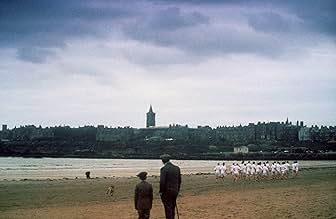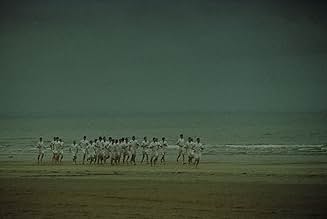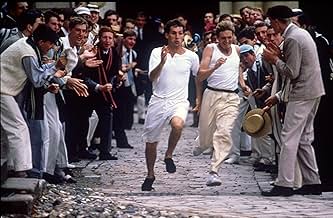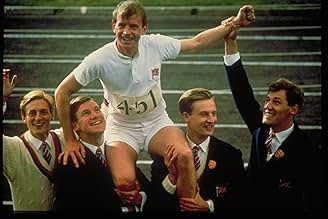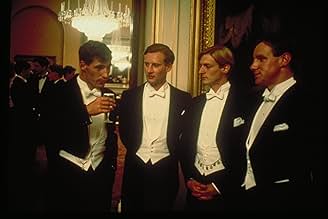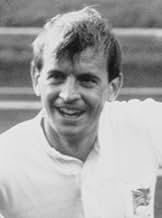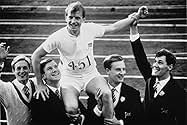Dos atletas británicos (uno judío y otro cristiano) compiten en las Olimpiadas de 1924.Dos atletas británicos (uno judío y otro cristiano) compiten en las Olimpiadas de 1924.Dos atletas británicos (uno judío y otro cristiano) compiten en las Olimpiadas de 1924.
- Dirección
- Guionista
- Elenco
- Ganó 4 premios Óscar
- 18 premios ganados y 19 nominaciones en total
John Gielgud
- Master of Trinity
- (as Sir John Gielgud)
- Dirección
- Guionista
- Todo el elenco y el equipo
- Producción, taquilla y más en IMDbPro
Opiniones destacadas
What an amazing movie it is... amazing is the word! I saw the movie today - on the 5th of Feb '09. What a pity that i couldn't experience the movie's aura earlier!
Chariots of Fire is an outstanding piece of work which may be easily, and deservedly so, termed as LEGENDARY! Watch this movie and you'll know what is inspiration and dedication...
The characterization is such exemplary that each and every character tell their own little story... The two main characters - Lindell and Abrahams - are such that you'll only want to know them better as you go on watching the movie... especially that of Lindell. The guy is so so dedicated and truthful that i for one would just feel honored to know him closely.
Guys, WATCH IT!!!!!!!!!!!!
Chariots of Fire is an outstanding piece of work which may be easily, and deservedly so, termed as LEGENDARY! Watch this movie and you'll know what is inspiration and dedication...
The characterization is such exemplary that each and every character tell their own little story... The two main characters - Lindell and Abrahams - are such that you'll only want to know them better as you go on watching the movie... especially that of Lindell. The guy is so so dedicated and truthful that i for one would just feel honored to know him closely.
Guys, WATCH IT!!!!!!!!!!!!
'tis been said that this movie is loved or hated, no middle ground.
I believe I know why.
It touches the most fundamental instincts and feelings in all of us.
The question it compels us to ask is, "Do I have a piece of greatness to offer to the world"?
Those of us who would answer yes, whether we believe is achievable or not, would love this movie, because it epitomizes the potential of our dreams, not just in running, but in any walk of life.
Those of us who would answer no, would hate this movie, because it highlights our acceptance of mediocrity, and of surrendered dreams.
Also, this movie touches those who have succeeded also.
It shows that there are two ways to succeed, the one not shown in the movie, and the one shown.
The one not shown is the one that motivates most truly successful people today. win at any cost, in sports, business, etc. and the consequences be damned.
The way to succeed shown in Chariots of Fire is probably naive by today's standards, but nonetheless noble and uplifting.
It tells us that success achieved through dedication, commitment, honesty and sacrifice is the noblest achievement a person can attain, and provides examples for others to emulate.
Liddell and Abrahams are not examples for runners, they are examples for people, true heroes of the spirit, not sport.
An unforgettable phrase, a torch to some and a knife to others,
" So where does the power to succeed come from?... It comes from within"
Those of us who have it, love it, those of us who do not have it, hate it.
If I live to be 100, I will still have my dreams stirred back to life by the message in this film
I believe I know why.
It touches the most fundamental instincts and feelings in all of us.
The question it compels us to ask is, "Do I have a piece of greatness to offer to the world"?
Those of us who would answer yes, whether we believe is achievable or not, would love this movie, because it epitomizes the potential of our dreams, not just in running, but in any walk of life.
Those of us who would answer no, would hate this movie, because it highlights our acceptance of mediocrity, and of surrendered dreams.
Also, this movie touches those who have succeeded also.
It shows that there are two ways to succeed, the one not shown in the movie, and the one shown.
The one not shown is the one that motivates most truly successful people today. win at any cost, in sports, business, etc. and the consequences be damned.
The way to succeed shown in Chariots of Fire is probably naive by today's standards, but nonetheless noble and uplifting.
It tells us that success achieved through dedication, commitment, honesty and sacrifice is the noblest achievement a person can attain, and provides examples for others to emulate.
Liddell and Abrahams are not examples for runners, they are examples for people, true heroes of the spirit, not sport.
An unforgettable phrase, a torch to some and a knife to others,
" So where does the power to succeed come from?... It comes from within"
Those of us who have it, love it, those of us who do not have it, hate it.
If I live to be 100, I will still have my dreams stirred back to life by the message in this film
I watched this again last night. I had forgotten just how beautifully done it was - both a character study of two very different men and a gripping plot of their attempts to succeed - partly through athletics. the writer and director so well convey both Cambridge and the Edinburgh Presbyterian missionary disciples, in the early 1920s so very well.
The acting is superb - I had never seen a character presented like Eric Liddell in movies - how fine Ian Charleson was in this role, the softness of his voice, his ease and joy in running competitively (especially in contrast with the tense tortured Harold Abrahams). I also loved the more supporting roles - I've read a biography of F.E. Smith and Nigel Davenport is exactly how I would imagine him. The actor who played the Prince of Wales also seemed exactly right with his effortless charm, looks, and lack of imagination. Ian Holm, John Gielgud, Lindsay Anderson - all wonderful.
The actors weren't chosen for glamour either - Liddell and Abrahams are not Leni Riefenstahl images of athletic ideals, Liddell's sister is no beauty - and Abrahams' girlfriend is pretty but not stunning. It made them seem more real. (In nice contrast were the near-pretty boy looks of Nigel Havers as Lord Lindsay - it so suited his character).
The races are riveting - partly due to the music and sound effects.
So many small things are done so well - e.g., when Lord Lindsay has the confidence of his class to barge into a room containing the Prince of Wales, and three other lords (including Birkenhead and the head of the British Olympic Committee) and greets them by name - no need for introduction there (as there was for Liddell). It's small but seems quite real.
As an American, it was interesting and funny to see our Olympic team shown as the numerous, ominous, invulnerable "other"! (something like watching a Rocky movie with Rocky as the product of a Russian or East German success machine!). In fact, the one scene that seemed a bit off was the scene of the American track athletes warming up for the Games - all heavy music, machine like athletes, ferocious coach yelling with a megaphone into people's ears. It pounded too hard on the "these are the scary almighty inhuman opponents" theme in contrast to the cheerful British boys running along the beach.
Something I had forgotten about the movie was how stubborn BOTH protagonists are - Liddell fully as much as Abrahams. Liddell is not overly deferential or bashful when dealing with the Prince of Wales - but instead straightforward and very firm.
I truly can't understand anyone not liking this movie - it is very exciting even on the basic level of "will they win?" and so much more. (For example, Ian Holm's character's reaction to success after 30 years is very moving). Those who write to say that "Reds" deserved the Oscar more - are simply wrong. (Reds was so simplistic that it felt like watching the movie "The Hardy Boys Go to the Russian Revolution"). Those who say they cannot differentiate among the boys or between the Scottish and English accents - well, it sounds like some political statement to me.
Do watch it - it's very fine, very moving, very exciting.
The acting is superb - I had never seen a character presented like Eric Liddell in movies - how fine Ian Charleson was in this role, the softness of his voice, his ease and joy in running competitively (especially in contrast with the tense tortured Harold Abrahams). I also loved the more supporting roles - I've read a biography of F.E. Smith and Nigel Davenport is exactly how I would imagine him. The actor who played the Prince of Wales also seemed exactly right with his effortless charm, looks, and lack of imagination. Ian Holm, John Gielgud, Lindsay Anderson - all wonderful.
The actors weren't chosen for glamour either - Liddell and Abrahams are not Leni Riefenstahl images of athletic ideals, Liddell's sister is no beauty - and Abrahams' girlfriend is pretty but not stunning. It made them seem more real. (In nice contrast were the near-pretty boy looks of Nigel Havers as Lord Lindsay - it so suited his character).
The races are riveting - partly due to the music and sound effects.
So many small things are done so well - e.g., when Lord Lindsay has the confidence of his class to barge into a room containing the Prince of Wales, and three other lords (including Birkenhead and the head of the British Olympic Committee) and greets them by name - no need for introduction there (as there was for Liddell). It's small but seems quite real.
As an American, it was interesting and funny to see our Olympic team shown as the numerous, ominous, invulnerable "other"! (something like watching a Rocky movie with Rocky as the product of a Russian or East German success machine!). In fact, the one scene that seemed a bit off was the scene of the American track athletes warming up for the Games - all heavy music, machine like athletes, ferocious coach yelling with a megaphone into people's ears. It pounded too hard on the "these are the scary almighty inhuman opponents" theme in contrast to the cheerful British boys running along the beach.
Something I had forgotten about the movie was how stubborn BOTH protagonists are - Liddell fully as much as Abrahams. Liddell is not overly deferential or bashful when dealing with the Prince of Wales - but instead straightforward and very firm.
I truly can't understand anyone not liking this movie - it is very exciting even on the basic level of "will they win?" and so much more. (For example, Ian Holm's character's reaction to success after 30 years is very moving). Those who write to say that "Reds" deserved the Oscar more - are simply wrong. (Reds was so simplistic that it felt like watching the movie "The Hardy Boys Go to the Russian Revolution"). Those who say they cannot differentiate among the boys or between the Scottish and English accents - well, it sounds like some political statement to me.
Do watch it - it's very fine, very moving, very exciting.
I was a student at Edinburgh University in 1981 and was actually lodging with one branch of Eric Liddell's family.
My friends and I all went to see this movie repeatedly -- and I mean five, six, or seven paid entrances. Why?
Personally, I don't think it had anything to do with the plot, character development, the music, or moral virtue. It was simply that the film was so utterly beautiful.
The men were beautiful in a clean, non-glamorous way that we had never seen before. Not in British films, and certainly not in Hollywood movies.
The social and educational expectations shared by all were beautiful. I know it is fashionable to decry the British class system, and in principle I agree with all the criticisms. But it also seems that erasing class-by-birth leaves little else but crass meritocracy and the sheer vulgarity of the uneducated masses. Abraham's fellow students at Cambridge and Liddell's at Edinburgh participated in a social and educational system not driven by concerns about jobs, and not pathetically challenged by students who saw themselves as consumers and professors as entertainers.
Britain was beautiful. Of course some parts still are, but Nazi bombs, post-war architecture, and modern cars have destroyed much. This was a Britain where people at the time might have decried "Victorian" architecture, but we in 1981 were just coming to realize how great it was. And this was a Britain where, for good or ill, middle class people kept their houses tasteful, and working-class door-steps were white-stoned each week.
In all this movie was a connection to the beautiful aspects of the British past. That past might never have existed in reality, but in 1981 we could just about touch it, above all in Edinburgh, spared by German bombs and still one of the most beautiful cities in the world.
My friends and I all went to see this movie repeatedly -- and I mean five, six, or seven paid entrances. Why?
Personally, I don't think it had anything to do with the plot, character development, the music, or moral virtue. It was simply that the film was so utterly beautiful.
The men were beautiful in a clean, non-glamorous way that we had never seen before. Not in British films, and certainly not in Hollywood movies.
The social and educational expectations shared by all were beautiful. I know it is fashionable to decry the British class system, and in principle I agree with all the criticisms. But it also seems that erasing class-by-birth leaves little else but crass meritocracy and the sheer vulgarity of the uneducated masses. Abraham's fellow students at Cambridge and Liddell's at Edinburgh participated in a social and educational system not driven by concerns about jobs, and not pathetically challenged by students who saw themselves as consumers and professors as entertainers.
Britain was beautiful. Of course some parts still are, but Nazi bombs, post-war architecture, and modern cars have destroyed much. This was a Britain where people at the time might have decried "Victorian" architecture, but we in 1981 were just coming to realize how great it was. And this was a Britain where, for good or ill, middle class people kept their houses tasteful, and working-class door-steps were white-stoned each week.
In all this movie was a connection to the beautiful aspects of the British past. That past might never have existed in reality, but in 1981 we could just about touch it, above all in Edinburgh, spared by German bombs and still one of the most beautiful cities in the world.
I beg to differ with several previous reviewers. This film is neither bland nor is it solely about professionalism vs. amateurism.
This film is about what drives people to do what they do. Eric Liddell (Ian Charleson) runs for the glory of God, whereas Harold Abrahams (Ben Cross) runs to prove his worth to a society that was anti-Semitic. Even though they run for different reasons, their drive and determination spur them on. They stand up for what they believe in and refuse to sacrifice their principles because it is the easy way out.
The supporting cast is also extraordinary, with Nigel Havers, Nicholas Farrell, Ian Holm and Sir John Gielgud all making important contributions to the final product.
There is absolutely nothing unnecessary in this film. The writing, the direction, the acting, the dialogue are all outstanding. And then there's that haunting score.
Once again, this is truly an outstanding film. One with universal themes that transcend time and place.
This film is about what drives people to do what they do. Eric Liddell (Ian Charleson) runs for the glory of God, whereas Harold Abrahams (Ben Cross) runs to prove his worth to a society that was anti-Semitic. Even though they run for different reasons, their drive and determination spur them on. They stand up for what they believe in and refuse to sacrifice their principles because it is the easy way out.
The supporting cast is also extraordinary, with Nigel Havers, Nicholas Farrell, Ian Holm and Sir John Gielgud all making important contributions to the final product.
There is absolutely nothing unnecessary in this film. The writing, the direction, the acting, the dialogue are all outstanding. And then there's that haunting score.
Once again, this is truly an outstanding film. One with universal themes that transcend time and place.
Oscars Best Picture Winners, Ranked
Oscars Best Picture Winners, Ranked
See the complete list of Oscars Best Picture winners, ranked by IMDb ratings.
¿Sabías que…?
- TriviaWhen Colin Welland completed his first draft, the only title he could come up with was "Runners". Then, one Sunday evening he turned on BBC's religious music series Songs of Praise (1961), featuring the hymn "Jerusalem," with lyrics from a poem by William Blake. The chorus included the words "Bring me my chariot of fire". The writer leaped to his feet and shouted to his wife, "I've got it, Pat! 'Chariots of Fire'!" (The "Jerusalem" hymn is featured at the beginning and end of the movie.)
- ErroresWhen signing an autograph for a young fan, Eric Liddell does not unscrew or remove any cap from the pen he uses. As all fountain pens have caps, he seems to be using a modern day ballpoint pen which was not invented until 1938.
- Citas
Eric Liddell: I believe God made me for a purpose - but He also made me fast. And when I run, I feel His pleasure.
- Versiones alternativasThere is at least one slightly different version of the movie, issued in Europe on homevideo. The beginning is different - shorter - and introduces Harold Abrahams while playing cricket with his colleagues. The scene in the train station, where Monty meets Harold is absent, as well as the loading of the baggage in the taxi they share. We simply see Monty writing a letter to his parents, mentioning that "Harold is as intense as ever" (cut to the cricket scene, maybe 30 seconds long), and then continues with "I remember our first day... we shared a taxi together" (cut to the two students unloading their stuff from the car). This alternate version also have slightly different end credits, and does not mention Harold marrying Sybil. The differences are minor (the U.S. version provides a more shocking memento of WWI, when it shows crippled baggage handlers in the station); one of the reasons the cricket scene was dropped in favour of the station one was due to the distributor's worry that the American market would not understand it.
- ConexionesFeatured in Vangelis: Chariots of Fire (1981)
- Bandas sonorasHe is an Englishman
(1878) (uncredited)
from "H.M.S. Pinafore"
Music by Arthur Sullivan
Lyrics by W.S. Gilbert
Selecciones populares
Inicia sesión para calificar y agrega a la lista de videos para obtener recomendaciones personalizadas
- How long is Chariots of Fire?Con tecnología de Alexa
Detalles
- Fecha de lanzamiento
- País de origen
- Idiomas
- También se conoce como
- Chariots of Fire
- Locaciones de filmación
- Productoras
- Ver más créditos de la compañía en IMDbPro
Taquilla
- Presupuesto
- USD 5,500,000 (estimado)
- Total en EE. UU. y Canadá
- USD 58,972,904
- Fin de semana de estreno en EE. UU. y Canadá
- USD 68,907
- 27 sep 1981
- Total a nivel mundial
- USD 59,317,376
- Tiempo de ejecución
- 2h 5min(125 min)
- Color
- Mezcla de sonido
- Relación de aspecto
- 1.85 : 1
Contribuir a esta página
Sugiere una edición o agrega el contenido que falta







